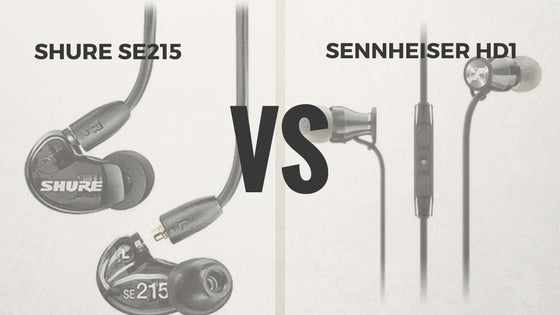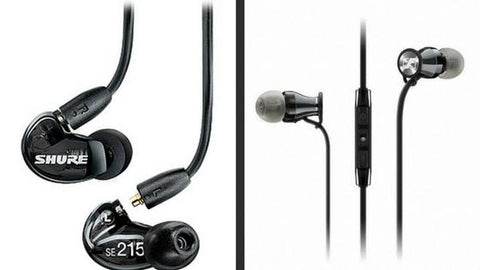Sennheiser HD1 Earphones vs. Shure SE215 Earphones Comparison Review
by Audio46 Headphones
(Updated )
Bookmark this article
Copy to clipboard
Email to a Friend

Due to market requests, Sennheiser is bringing the Momentum name back home. The HD1 In-Ear has now been replaced by the Momentum In-Ear.
Last week, a customer came into Audio 46 and asked, “What is the difference between the Sennheiser HD1 Earphones and the Shure SE215 Earphones?” It is a great question, especially since both earphones are the same price at $99.99. In order to give them, and all our readers, a comprehensive answer, today I’m going to conduct a Sennheiser HD1 Earphones vs. Shure SE215 Earphones comparison review.
Before going into the details of my opinions, here are the specs:
Specifications
| Sennheiser HD1 with Momentum | Shure SE215 | |
|---|---|---|
| Driver Type | Dynamic | Dynamic Micro Driver |
| Impedance | 18 Ohms | 17 Ohms |
| Frequency Response | 15Hz-22kHZ | 22Hz-17.5kHz |
| Sensitivity | 118 db (1kHz/1Vrms) | 107 db SPL/mW |
| Microphone and Remote? | Mic and remote | none |
| Cable Length | 1.3 m | 1.62 m |
| Carrying case | zippering hard case | zippering softy pouch |
| Ear Tips | 4 sizes (xsm, sm, m, l) | 3 pairs silicone, 3 pairs foam |
Packaging
The Sennheiser HD1 has a neat and clean package. The earphones are wrapped inside their carrying case and the presentation is controlled. The Shure SE215 is messier in its package.
Both earphones include everything you need. The HD1 comes with four different sized silicone ear tips (extra small, small, medium, and large). The SE215 come with 3 pairs (small, medium, large) of silicone tips and 3 pairs (small, medium, large) foam tips. They both also come with zippering carrying cases. I like the HD1’s case the best because it has a hard shell and I wouldn’t feel concerned if it somehow found its way to the bottom my backpack.
Build and Design
Durability
Both the Sennheiser HD1 and the Shure SE215 seem quite durable, but each has different features to keep them safe. The HD1’s cable is attached but it has small loops by the earpiece that act as strain relievers. The SE215 has a detachable cable. Shure even sells the cable alone in case anything happens to it. It is a thicker than the HD1 as well. The SE215s can last a lifetime! I can’t say the same for the HD1.
Fit
If you’ve ever read any of my other earphone reviews, you know the sad truth about the size of my ears canals. They are small and I have a difficult time finding earphones that seal. The HD1 unfortunately don’t work for me. I tried the extra small ear tips first and they were too small. Then I tried the small ear tips and they were a bit too big. They keep wanting to slide out of my ears.On the other hand, the SE215s are actually able to seal! Victory! They also hook over the ears which makes them feel even more secure.
Style
Both earphones have nice looks. The Sennheiser HD1 has a more modern, stylish look while the Shure SE215 has a professional look. In this case, to each their own.
Other Features
The HD1’s cable has a microphone and remote attached. The SE215 has no such function but again, it does have a detachable cable.
Noise Isolation
One of the first things I noticed when I put the SE215 in my ears was the noise isolation. Immediately the ambient sound around me–humming printers, typing co-workers, far-off sirens– all quieted. The sound of my own typing was dulled and when I started playing music I couldn’t hear them at all. Pretty cool!
The HD1 didn’t have great noise isolation, although that may be in part to not being able to get a great seal in my ear canal. But, even while holding the earphones in place, I still didn’t have the same dulled sensation that I got from the SE215.
Sound
Bass
Both earphones had a nice low end, even though they were quite different. The HD1’s low end was warm and was more detailed than the SE215. By contrast, the SE215’s low end was also warm but very full feeling, making it sound a little but cloudy.
Mid-range
The first thing I noticed about the Sennheiser HD1’s mid-range is a bump around 200Hz. Bass guitars and rhythm guitars (depending on the mix of course) seem a little more hyped. That area of the frequency spectrum feels thick, yet sometimes cramped.
The Shure SE215 has a warmth and a spaciousness to its mid-range. There is a boost around 2kHz which makes the vocals sit a little higher in the mix than usual.
Treble
High end frequencies in the HD1 are nice and clear. A boost around 10kHz gives cymbals and strings extra power, but it is still smooth and pleasurable. There is also an airiness that isn’t present in the SE215s.
The SE215s have a detailed high end as well. It is less airy but is still spacious and pleasant.
Sound Stage
Width isn’t the strong suit of the HD1, but it does have nice top to bottom imaging–probably because of those extra frequencies above 20kHz.
The SE215 has a lot of depth in addition to having nice left to right imaging. I think it ends up coming down to preference to decide which is better in this arena, but I enjoy the SE215 more.
Overview
At $99.99, both the Sennheiser HD1 and the Shure SE215 are great earphones! It is hard to answer which earphone is better because they are quite different for each other. I would recommend the HD1 to a commuter who wants to be able to listen to music, answer phone calls, and quickly put the earphones in and take them out of your years. I would recommend the SE215 to someone who is more particular about sound stage and depth and doesn’t care about having a microphone and remote. They are also a better choice for those with small ears or for those who plan on head banging to their music. The hook around the ear helps to hold the earphones in place.
Come stop by Audio 46 in New York City to give them a try. Both earphones can be purchased here:

Get the Latest Headphone News and Reviews in Your Inbox
Subscribe to our newsletter and get 10% off your first purchase!*
*some restrictions may apply


 FREE
FREE 


